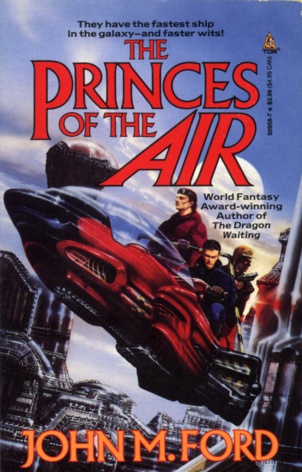The Princes of the Air (1982) is a short book that feels longer. It’s in my favourite subgenre of SF, planets and spaceships, and I really like John M. Ford’s writing, so I ought to love this book. The problem is that I don’t—I’ve never understood why I haven’t warmed to it. I re-read it from time to time hoping that this time I’ll get it.
All the ingredients are there. There are three friends in the underworld of an unimportant world in the Empire, conning their way into a better future. Orden becomes indentured to have a chance in the Diplomatic service, while David and Theo play the space simulators that are so realistic they can step into real ships and fly them when they get a chance. They all have dreams, and the cons that run get more and more complicated until they achieve their dreams, and then things get complicated. There’s a system of anti-aging, revies, where you can only have so many before your system won’t take it. There’s a weird way of going faster than light, into the Blue, where colours are different. There are lots of different worlds, with different problems.
There’s an Empire, ruled by a beautiful Queen, and when they play the game they say “For the Queen!” (There’s a lot of chess symbolism going on, not only Dr Bishop the teacher and ambassador, but the Rooks that guard the planet and the knighthoods they’re granted.) There are rebellions against authority. There’s a wonderful command-and-persuade language, ELI-3, which is rhyming iambic pentameter. There are samechs, sapient mechanisms, robots that can’t talk but use sign between themselves. Orden’s knowledge of samech sign is significant.
The universe is worked out in all its implications and second order implications. The plot’s fast moving and contains lots of instances of the heroes conning everyone and getting away with it. I was trying to think what to compare it to, and the first thing that came to mind was Walter Jon Williams’s Dread Empire’s Fall books, which let me see what’s wrong with this. It somehow isn’t fun.
A plot like this needs to be fun to work. It isn’t the suicidal depression Orden suffers after being interrogated. That just offsets the essential unrealism of three boyhood friends bluffing their way into being the three people essential to a Galactic Empire. I think the problem is that you have to pay fiendish attention every second to have a hope of following what’s going on. In Ford’s later books this is worth doing, but here there isn’t enough payoff. Most of the plot isn’t on the page, it has to happen in your head, and it’s more work than the worth of it for a story of interstellar intrigue with a lunatic villain and a hidden plot to restore the republic. Maybe I’m just not intelligent enough for this book, but even re-reading and knowing what’s going to happen I’m more inclined to say “Huh?” than “Ah!” at the revelations.
The details are brilliant—zero gravity banquets where you vector the meat through hanging globes of sauce, the ambassadors with their uniforms covered with genuine but meaningless ribbons, the spaceship called “Bellerofon” because the painter can’t spell. The worldbuilding hangs together at deep levels, everything is mentioned for a reason and the cons really are extremely clever.
At the panel on John M. Ford’s work at Anticipation, Teresa Nielsen Hayden said that he had a horror of being obvious, and his editors had to keep asking him to clarify. I suspect The Princes of the Air could have done with another round of this.
If you have read everything else of Ford’s, then of course you’ll want to get hold of this too, because even his minor works are worth reading. If you haven’t, I recommend everything that’s in print: the collection From the End of the Twentieth Century, The Last Hot Time, and most of all The Dragon Waiting.
Jo Walton is a science fiction and fantasy writer. She’s published eight novels, most recently Half a Crown and Lifelode, and two poetry collections. She reads a lot, and blogs about it here regularly. She comes from Wales but lives in Montreal where the food and books are more varied.










